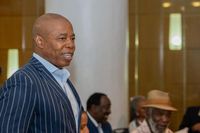In a dramatic twist to New York City’s already tumultuous mayoral race, sources have confirmed that top advisers to President Trump are actively exploring the possibility of nominating Mayor Eric Adams as the next U.S. ambassador to Saudi Arabia. The move, which has been described as both unconventional and politically charged, aims to persuade Adams to withdraw from his independent re-election campaign—a campaign that has struggled to gain traction against front-runner Zohran Mamdani.
According to reporting from the New York Post and The New York Times, the plan is being spearheaded by Steve Witkoff, a billionaire real estate investor, Trump confidant, and the administration’s special envoy to the Middle East. Witkoff met with Adams in a secretive session in Florida earlier this week, underscoring the seriousness of the effort. While the talks remain fluid and could collapse for any number of reasons, the ambition is clear: to offer Adams a prestigious diplomatic post that would allow him to gracefully exit the crowded mayoral contest.
“Officials at the highest levels inside the Trump administration have been searching for a cushy gig for Adams, with an ambassadorship being floated,” reported the New York Post. The logic behind the move is straightforward—if Adams were to accept the nomination and step aside, it could dramatically reshape the dynamics of the November 2025 election. As of early September, Zohran Mamdani leads the pack, with Adams and former Governor Andrew Cuomo both running as independents on overlapping support bases.
Yet, as with many things in politics, the reality is more complicated. Adams, a Democrat who opted out of the party’s primary amid sagging popularity and a recent federal indictment (later dropped), has publicly denied any interest in joining the Trump administration. “I will finish my first term as mayor,” Adams declared, attempting to silence swirling rumors. Privately, however, he has told allies he is weighing his options, particularly as the details of any potential deal remain in flux. Would he be allowed to serve out the remainder of his term before taking up the diplomatic post? Or would he be expected to resign immediately?
Adding to the intrigue, President Trump himself has signaled a desire for a shake-up in the mayoral race. On Thursday, September 4, Trump told reporters he would prefer to see two candidates “drop out” to enable a more direct showdown with Mamdani, the Democratic nominee. According to The New York Times, Trump has privately expressed the view that Andrew Cuomo, despite their “dysfunctional marriage” of political rivalry and acquaintance, is best positioned to win a head-to-head contest against Mamdani. The former governor, for his part, has joked to donors about his complicated relationship with Trump, but both he and Adams are now running on independent ballot lines.
The idea of a diplomatic posting for Adams has not been formally endorsed by the White House, and neither Adams’s campaign spokesman nor the White House itself would comment on the record. Nonetheless, the political calculus is evident: removing Adams and Curtis Sliwa, another long-shot candidate, from the field could pave the way for Cuomo’s third-party candidacy to mount a serious challenge to Mamdani. Sliwa, founder of the Guardian Angels, has insisted he is not interested in any Trump administration job and intends to stay in the race until the end.
The ambassadorship to Saudi Arabia is no small prize. Traditionally, it is a post that has alternated between career diplomats and political appointees with significant clout. The most recent ambassador, Michael Ratney, was a seasoned diplomat who resigned in January 2025. Should Adams be nominated, it would represent a striking departure from recent precedent, given his limited foreign policy experience. Yet, Adams has traveled to the kingdom and other Middle Eastern countries, and he referenced those trips during a public event on September 4, where he praised the values of Muslim communities abroad. “And when I visited Saudi Arabia, when I visited Jordan, when I visited Oman, when I visited part of the African diaspora, and watched the Muslim population there, they truly believe in peace,” Adams said. “They believe in forgiveness, and they believe in the prosperity of the countries they are in.”
For Adams, the offer comes at a fraught moment. His campaign for a second term has been hampered by low approval ratings, the shadow of a now-dropped federal indictment, and skepticism from fellow Democrats who have watched his overtures to Trump with unease. The Justice Department dropped the charges against him in February 2025, with Trump later remarking, “I helped him out a little bit,” adding that Adams was “unfairly” targeted. The mayor’s decision to skip the Democratic primary was seen by many as an acknowledgment of his vulnerability within the party.
Political insiders note that even if Adams were to suspend his campaign, his name would still appear on the November ballot unless he resigns and leaves New York City. That technicality could complicate any effort to clear the field for Cuomo or any other candidate. Meanwhile, ambassadorships require Senate confirmation—a process that can stretch out for months, leaving plenty of time for new wrinkles to emerge.
As the story unfolds, the uncertainty is palpable. Will Adams accept the diplomatic overture and bow out of the race? Will Cuomo seize the opportunity to consolidate anti-Mamdani votes? Or will the crowded field remain unchanged, setting up a chaotic and unpredictable election this fall?
For now, all eyes are on Adams, Witkoff, and the Trump White House, as the fate of New York’s mayoral contest hangs in the balance. The next few weeks could prove decisive—not just for the city, but for the broader political landscape as well.
Whatever happens, the behind-the-scenes maneuvering reveals just how high the stakes have become in New York City politics, and how national ambitions can collide with local realities in the most unexpected ways.

